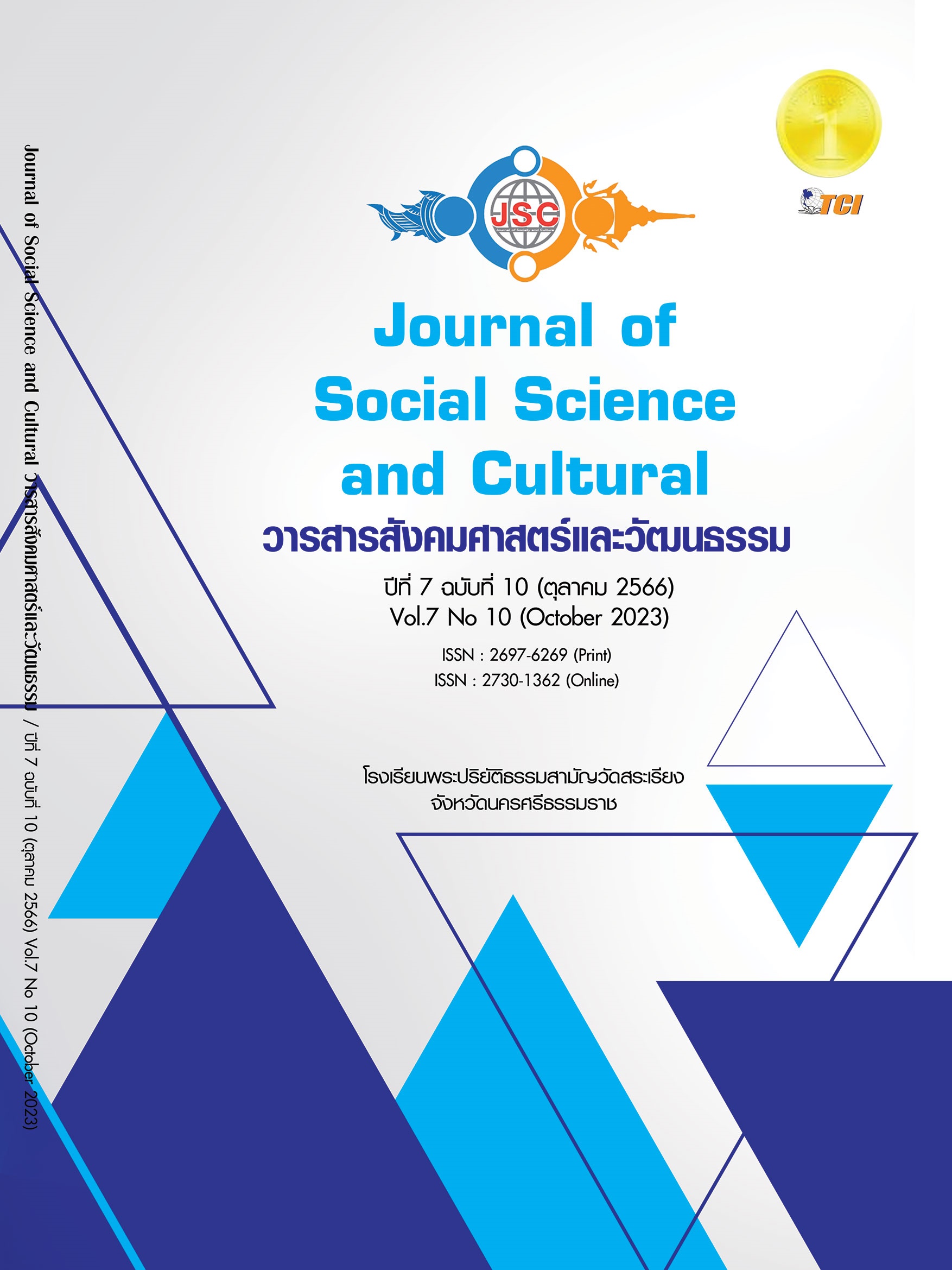FACTORS AFFECTING THE SUCCESS OF THE IMPLEMENTATION OF BLUE FLAG WELFARE PROGRAM POLICY IN BANGKOK
Main Article Content
Abstract
The objective of this research is to 1) study the level of success in implementing the national flag policy in the area of Bangkok 2) investigate the factors influencing the success of implementing the national flag policy in the area of Bangkok, and 3) study the recommendations for implementing the national flag policy in the Bangkok metropolitan area. The sample group used in the research consists of business operators participating in the national flag policy program in the Bangkok metropolitan area, which is still in operation in the year 2021, totaling 353 people. Data was collected using a questionnaire with approximately 5 levels of data analysis using statistical methods, including frequency, percentage, mean, standard deviation, and structural equation modeling. Research findings are as follows: The success in implementing the national flag policy in the Bangkok metropolitan area is generally at a high level. Factors such as the characteristics of business operators, distribution channels, and the network of national flag business operators have a positive impact on the success of implementing the national flag policy in the Bangkok metropolitan area, statistically significant at the 0.05 level. Business operators of national flag stores should diversify distribution channels, create genuine data for store management, build networks with other operators, and comply with government regulations in implementing the policy.
Article Details
References
ชัญญาภัค หล้าแหล่ง และคณะ. (2561). การสร้างเครือข่ายทางธุรกิจกับความได้เปรียบทางการแข่งขันของกลุ่มวิสาหกิจชุมชน. Veridian E-Journal, Silpakorn University ฉบับภาษาไทย สาขามนุษยศาสตร์ สังคมศาสตร์ และศิลปะ, 11(2), 3447-3464.
ฝนทิพย์ ฆารไสว. (2554). การศึกษาคุณลักษณะของผู้ประกอบการที่ประสบความสำเร็จของธุรกิจโรงแรม ในจังหวัดภาคเหนือตอนล่างของไทย. วารสารวิทยาการจัดการและสารสนเทศศาสตร์ มหาวิทยาลัยนเรสวร, 7(1), 39-50.
พัชรกันย์ เธียรชุตินันท์ และสมเดช มุงเมือง. (2562). นโยบายสาธารณะเพื่อพัฒนาคุณภาพชีวิตผู้มีรายได้น้อย ผ่านบัตรสวัสดิการแห่งรัฐ. วารสารมหาจุฬาวิชาการ, 6(2). 333-345.
มณีวรรณ บรรลุศิลป์ และปรางทิพย์ เสยกระโทก. (2561). ปัจจัยที่มีอิทธิพลต่อการตัดสินใจเลือกซื้อสินค้าในร้านค้าปลีกดั้งเดิม (ร้านโชห่วย). วารสารวิชาการและวิจัยมหาวิทยาลัยภาคตะวันออกเฉียงเหนือ, 8(2), 1-15.
รพีพรรณ พงษ์อินทร์วงศ์ และคณะ. (2563). ปัจจัยที่ส่งผลต่อความเข้มแข็งของผู้ประกอบการเอส เอ็ม อี สตาร์ทอัพ กรณีศึกษาเขตพื้นที่จังหวัดบุรีรัมย์. วารสารสหวิทยาการจัดการ คณะวิทยาการจัดการ มหาวิทยาลัยราชภัฏบุรีรัมย์, 3(2), 11-19.
วรมรรณ นามวงศ์ และคณะ. (2562). คุณลักษณะการเป็นผู้ประกอบการ ของเจ้าของธุรกิจค้าปลีกที่เข้าร่วมโครงการธงฟ้าประชารัฐ กรณีศึกษา : พื้นที่ภาคเหนือตอนบนของประเทศไทย. วารสารบริหารธุรกิจ มหาวิทยาลัยแม่โจ้, 1(1), 48-59.
วลัย ซ่อนกลิ่น. (2562). กลยุทธ์การค้าปลีกที่ส่งผลต่อความสำเร็จในการดำเนินธุรกิจของผู้ประกอบการค้าปลีกวัสดุก่อสร้าง ในเขตกรุงเทพมหานคร. วารสารมนุษยศาสตร์และสังคมศาสตร์ มหาวิทยาลัยราชภัฏอุบลราชธานี, 10(2), 233-247.
วันวิสาข์ โชคพรหมอนันต์. (2558). คุณลักษณะของผู้ประกอบการที่มีต่อความสำเร็จในการดำเนินธุรกิจของผู้ประกอบการร้านค้าในตลาดน้ำดอนหวาย จังหวัดนครปฐม. Veridian E-Journal,Slipakorn University ฉบับภาษาไทย สาขามนุษยศาสตร์สังคมศาสตร์ และศิลปะ, 8(2), 967-988.
สุจินดา เจียมศรีพงษ์. (2554). ธุรกิจค้าปลีกแบบดั้งเดิม (ร้านโชห่วย): ปัญหาและทางแก้ไข. วารสารวิทยาการจัดการและสารสนเทศศาสตร์, 6(1), 9-23.
Aaker, D. A. (2014). Aaker on Branding 20: Principles that Drive Success. New York: Morgan James Publishing.
Lumpkin, G.T. et al. (2009). Understanding and Measuring Autonomy: An Entrepreneurial Orientation Perspective. Entrepreneurship Theory and Practice, 3(1), 47-69.
Yamane, T. . (1973). Statistics: An Introductory Analysis. (3rd Ed). New York: Harper and Row Publications.


